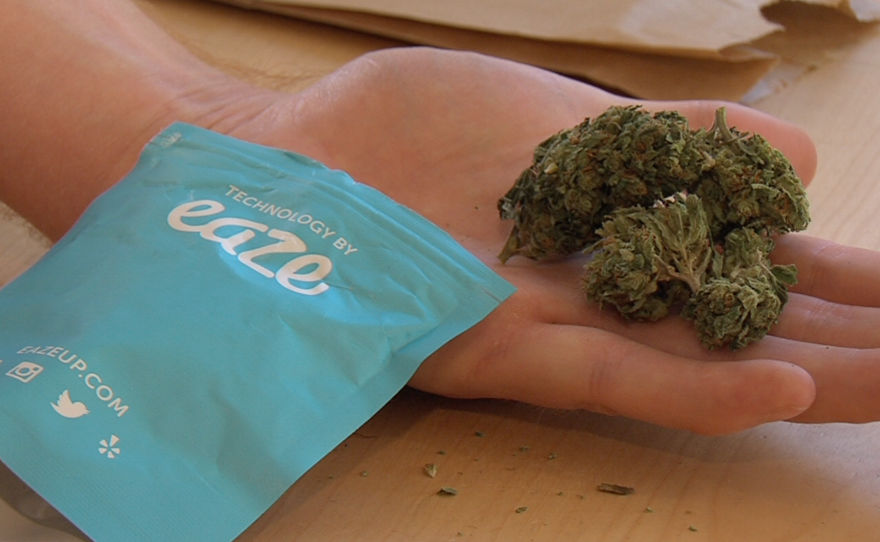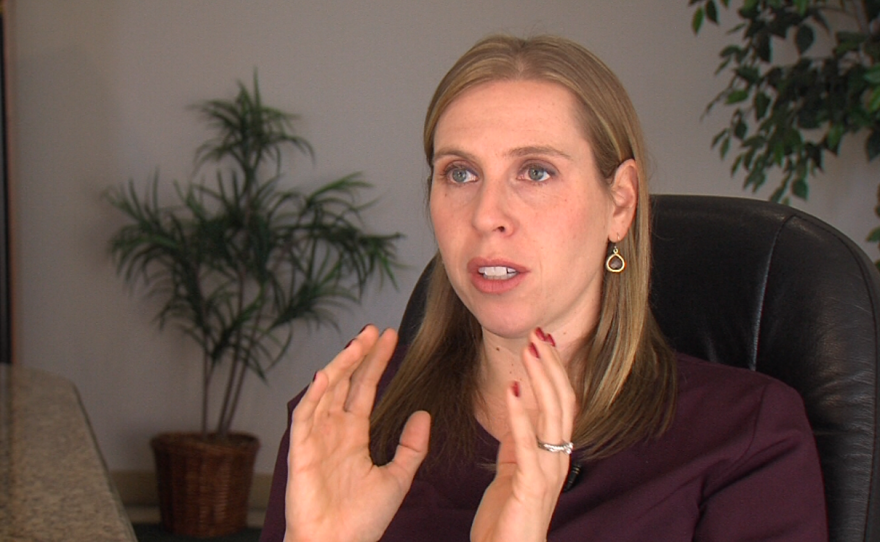San Diego's first legal medical marijuana dispensary, A Green Alternative, opened its doors for business in Otay Mesa on March 20. Its application and approval process took 13 months.
Since then, 11 other dispensaries have managed to get licenses from the city. San Diego's strict zoning regulations, passed nearly two decades after California legalized medical marijuana, have made it difficult for storefront dispensaries to find places to operate. Those conditions have led to a boom in a less visible, less regulated sector of the pot industry: medical marijuana delivery services.
Kimberly Simms, a San Diego lawyer specializing in medical marijuana law, said delivery is one of the least regulated sectors of the market. San Diego's zoning ordinance does not address delivery at all.
Simms said because delivery services are less visible than storefront dispensaries, city governments have been content to look the other way.
"They're not getting calls from their constituents complaining about that pesky delivery service," she said. "It’s such a controversial topic that they’re not going to invite the conversation to their doorsteps."
A search on the marijuana tracking site weedmaps.com shows a few dozen storefront pot dispensaries operating in San Diego — some with licenses, some without — and more than 100 delivery services. Simms said the relative ease of starting up a delivery-only service in San Diego, coupled with a broader trend toward on-demand consumer services, has made delivery an attractive option for those looking to start a medical marijuana consumer cooperative.
"If additional cities were to open up land use and zoning for storefronts, and you provided more opportunity for a brick-and-mortar, I definitely think people would take advantage of that," Simms said. "But I don't think that would ... eliminate the delivery service. It's a great model — it's very 'now.'"
There's an app for that
Adding to the abundance of marijuana delivery is a growing group of third-party apps and websites that connect medical marijuana patients to on-demand delivery services in their area.
Eaze, Grassp, Meadow and Nugg all offer pot delivery in San Diego. Nestdrop and Flow Kana operate elsewhere in California, and Canary delivers in Washington.
Eaze, which launched service in San Diego this past summer, also offers a parallel service called EazeMD to help Californians obtain a doctor's recommendation for marijuana.
After creating an account with a California ID, users are linked via videoconference to a doctor, who in turn can upload a PDF of a recommendation letter to the user's account. Once fully verified, the patient can shop a number of cannabis strains and products, ranging from $25 for an eighth of an ounce of marijuana to $210 for a half ounce.
(Full disclosure: To see how easy Eaze is, I registered on the site for this article and was able to get a doctor's recommendation and have marijuana delivered in less than 45 minutes. I told the doctor I suffer from occasional insomnia. I did not purchase the marijuana when the deliveryman arrived).
Eaze CEO Keith McCarty said he chose blue and white for the site's design theme — over the oft-favored green — to emphasize its focus on health care. A blog post also explained a decision to nix a photo of a man displayed prominently on the website, after Jimmy Kimmel joked on his late-night show that the man already looked "stoned."
McCarty said Eaze's users tend to be male millennials, but that the company aims to appeal to a broad demographic, including people who don't see themselves as regular marijuana users.
"A stay-at-home soccer mom is not going to go to the current (marijuana) doctor, or they’re not going to go to the seedy neighborhood for the dispensary," he said. "They want the easy, quick and professional, and maybe even discreet way in which they can receive and even consume the medicine."
Are the delivery services legal?
Even though the federal government continues to outlaw the use of marijuana, current California law allows pot to be grown and distributed but only by not-for-profit patient cooperatives. However, no state body exists to verify a cooperative's not-for-profit status. (Landmark statewide regulatory laws signed by Gov. Jerry Brown last month will allow for-profit sales in the future.)
Eaze and other for-profit marijuana-related companies say they are not selling marijuana but using technology to connect marijuana patients with local cooperatives.

The legality of services like EazeMD or HelloMD is less clear, said Jessica McElfresh, a San Diego lawyer in the medical cannabis industry.
State telehealth regulations were written for doctors who have an existing and ongoing relationship with a patient, McElfresh said, and the California Medical Board's guidelines on recommending medical marijuana call for "history and an appropriate prior examination of the patient."
McCarty said Eaze's legal team has vetted EazeMD's compliance with telehealth laws, and that a consultation via EazeMD can provide the same standard of care as one in a traditional doctor's office.
California doctors specializing in cannabis are widely known to rubber stamp requests for marijuana recommendations from patients, and KPBS's three-minute consultation via EazeMD may be representative of a similar standard of care practiced at brick-and-mortar offices of "pot doctors." Whether online or in person, McElfresh said, those doctors may still be putting their licenses at risk.
"I might find it concerning that the doctor has not conducted a physical examination, nor has any member of the staff collected any vitals," she said. "It also doesn't sound like five minutes would have been enough for that doctor to review medical records or test results compiled by another doctor."
Green potential
Both marijuana delivery services and third-party delivery apps will fall under California's new medical marijuana regulatory laws. The laws will require delivery services to list a physical place of business where state and local authorities can audit records and inventory, Simms said.
Until those regulations are fully implemented, she said, companies like Eaze, Grassp and Meadow can force their respective marijuana delivery cooperatives to be more compliant with the law.

"You now have a travel manifest, you have receipts, you have far more records than a delivery service might be keeping when left to their own devices," Simms said.
The new state laws also expressly allow cities and counties to ban storefront pot dispensaries and delivery services. Simms said while San Diego's own rules are not perfect, they were a step in the right direction — and that having model regulations at the state level may encourage cities that previously have been reluctant to discuss cannabis to now take on the issue.
"It’s a game changer," she said. "It's definitely a shift in how California has been doing things."
A recent study of the North American cannabis market projected billions of dollars in potential growth in the coming years. And as the likelihood of a 2016 referendum to legalize recreational marijuana in California grows, companies like Eaze are lining up to cash in.
"California is by far the largest market for cannabis in the U.S.," McCarty said. "Assuming the experts are right, and (legalization) actually does happen, we want to be fully prepared for that tidal wave."






